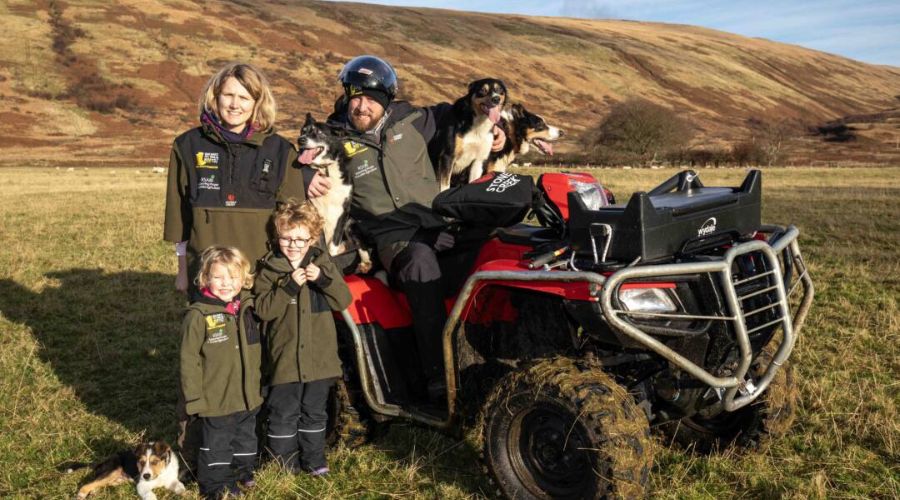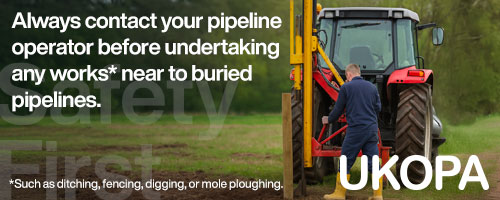Farmer who survived traumatic ATV crash speaks out on safety
23rd July 2025
Isle of Arran farmer Callum Lindsay is urging other farmers to wear a helmet and take five extra minutes to think about safety, after he was severely injured in an ATV accident.

Callum Lindsay, 31, who farms sheep on the Isle of Arran, is working with the Farm Safety Foundation/Yellow Wellies to raise awareness of ATV safety after an accident that saw him fracture his C1 and C2 vertebrae.
Callum, who farms 4,500 acres of tenanted hill farms, as well as the 170-acre home farm, went out in heavy rain to move sheep to a place of safety – but his ATV hit a stone concealed by bracken. Despite not travelling fast, he was projected over the handlebars and his face went into the front rack, knocking him unconscious.
He came round lying in front of the bike, and found the dogs had moved the sheep to a safe place – but with no phone signal in the area he had to get back on the bike before he could call for help.
“I was unaware of the extent of the injuries that I’d done to myself at that given point in time,” he added.
X-rays revealed he had fractured the top two vertebrae in his neck and also fractured around his nose socket. He had to be airlifted to the hospital on the mainland, where he remained for some time.
Ten days after returning home, the cartilage detached from the inside of his nose, prompting a return to hospital for reconstructive surgery and a blood transfusion.
Safety campaign
Since the accident, Callum has worked with RSABI and Yellow Wellies to raise awareness of the importance of wearing a helmet.
“I’m not saying that wearing a helmet would have eliminated me from having any injury, but it would have reduced the amount of injury that I sustained, and it would definitely have reduced my recovery period.
“Accidents are still going to happen,” he added. “But by putting all the safety things in place, it’s reducing them and encouraging people to reduce the volume of accidents or the potential for an accident on their farm is what I feel I can return to the industry.”
Callum fortunately made a full recovery, though it took more than a year, and he has been able to return to farming.
He believes those who have survived these types of accidents have an important role to play in helping the industry to change.
No farmer sets out to have an accident
Commenting on the stories shared during Farm Safety Week, he said: “They’ve got lots of very sad and tragic stories and people that have survived and had severe implications.
“It’s seeing and hearing those stories that are going to reduce it because you can relate to it. Everybody’s jumped over a PTO shaft, everybody’s gone on a bike without a helmet. To me, that is what is going to reduce that figures that HSE are producing.”
He added: “There are too many deaths, there’s too many accidents on farms, but no farmer sets off to have an accident. I didn’t set off to come off that bike that day, but it’s doing things just that wee bit differently that gets you there.
“It might take five minutes longer, but what’s five minutes longer compared to being set up for six months?”
He wants to see wearing a helmet becoming the norm and part of a daily routine, and observed that during his time in New Zealand shearing over four seasons, helmets have been embraced there more readily than in the UK – even being a legal requirement in some cases.
“I don’t go on a bike without a helmet now. I feel more comfortable on a bike with a helmet. But to start with, I didn’t, you’re always forgetting it, but once you’ve got into the habit it just becomes normal and you don’t think about it.”
READ MORE: Fatal injuries on farms remain stubbornly high
READ MORE: How to farm safely near buried pipelines
Farmers under pressure
It’s often said that recklessness in the industry is the root cause of its poor safety record, but Callum pointed out that farmers are also facing time and financial pressures.
“A lot of people are working on their own […]. It’s not that they’re cutting corners, they’re just trying to save money. There’s that little money left in the industry that not everybody can have fancy lifting baskets and pay the electrician to come and change a bulb.”
He added: “If you look at the industry from where it was, say, 50 years ago, there were far more people in the agricultural industry, and now one man is trying to do what three people were doing. There’s only so much that one person can physically do become before they become tired. […]
“The reality is that farmers have got so much to do – they’re the accountant, the cleaner, the plumber, they’re trying to do everything.”
However, little things can make a difference, and Callum believes time is the biggest safety factor.
“Doing things just a wee bit differently could reduce the risk they face on a day-to-day basis. After I had my accident, I evaluate things a lot differently. I might take an extra five minutes and check things a lot more.”
Focusing on mental wellbeing
With a wife and two young children, one thing that spoke to Callum about the Yellow Wellies campaign was the slogan ‘Who would fill your boots?’
Since his accident and work with the campaign, he’s noticed that many of the local farmers are now wearing helmets – and his local ATV dealer has also reported an increase in helmet sales.
This Farm Safety Week, Callum said he also wants people to give more thought to their mental wellbeing.
“If they thought a wee bit more about their mental wellbeing, they would be in a more positive mental mindset to change towards safety and accept looking at things for two or three minutes longer, or take four seconds to put their helmet on.”
He added: “It’s hard to explain to somebody to change that mindset until they’ve had an accident. Until I had my accident, I thought, it’s never gonna happen – just charge on, it will be absolutely fine.
“Once you’ve had an accident, you take a whole different outlook to things, and it’s trying to change that outlook to people before they have an accident.
“That would be a life goal ticked off if I can change the way that people look at things before they have an accident, especially young people.”


